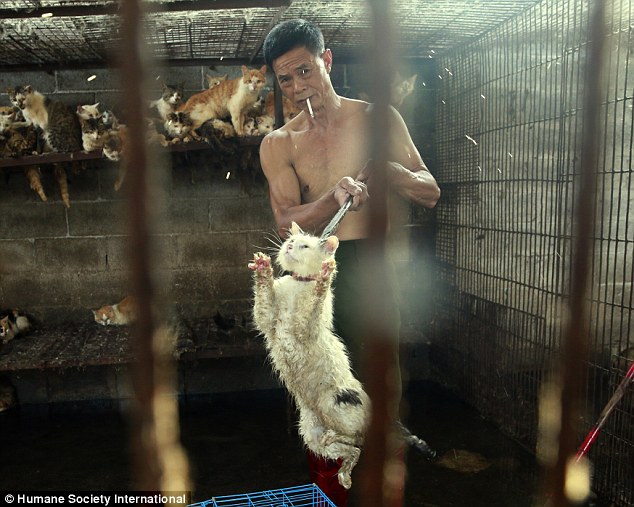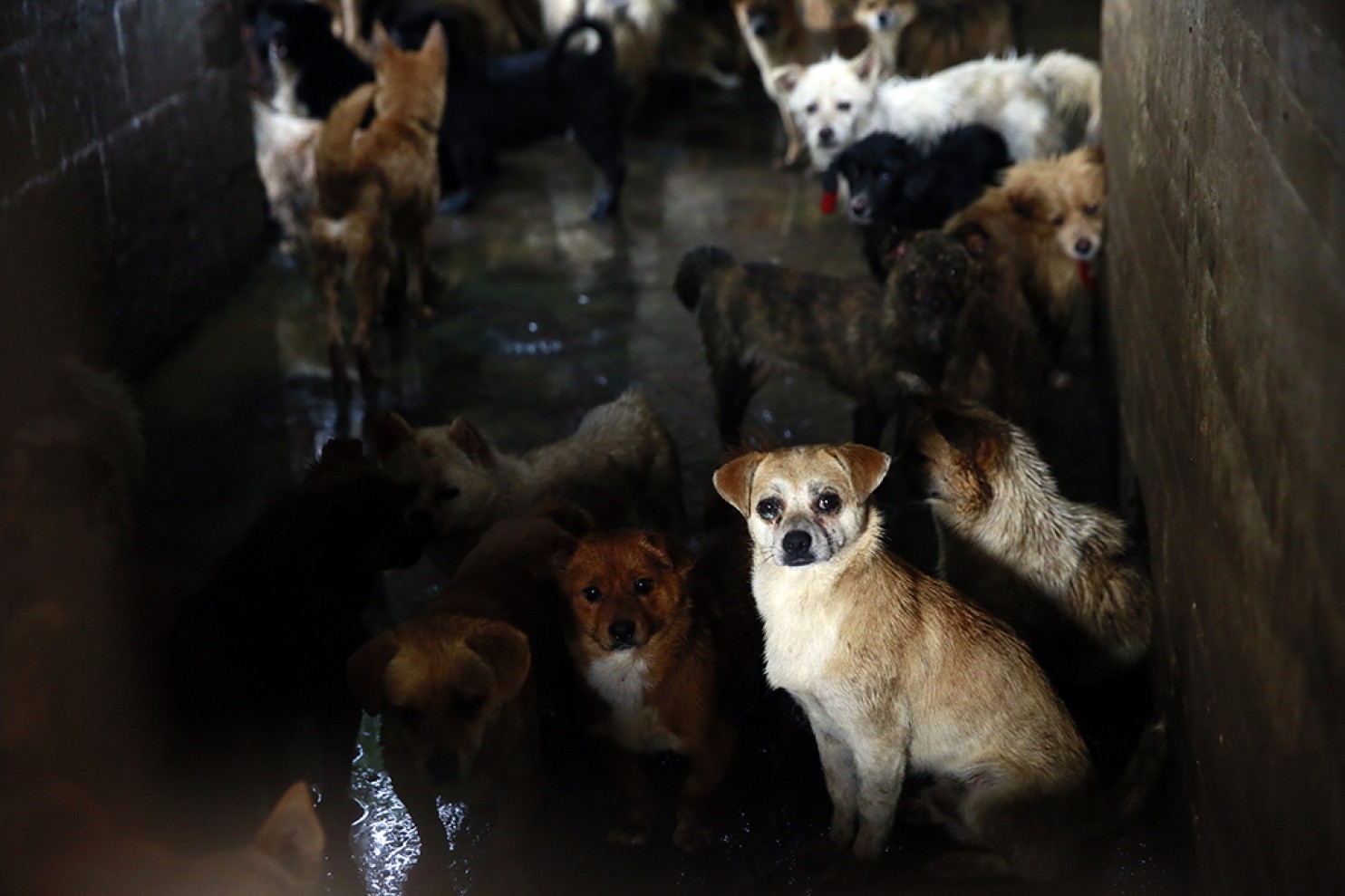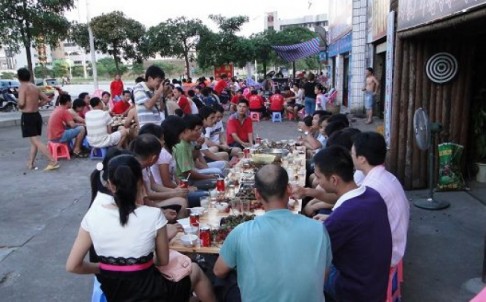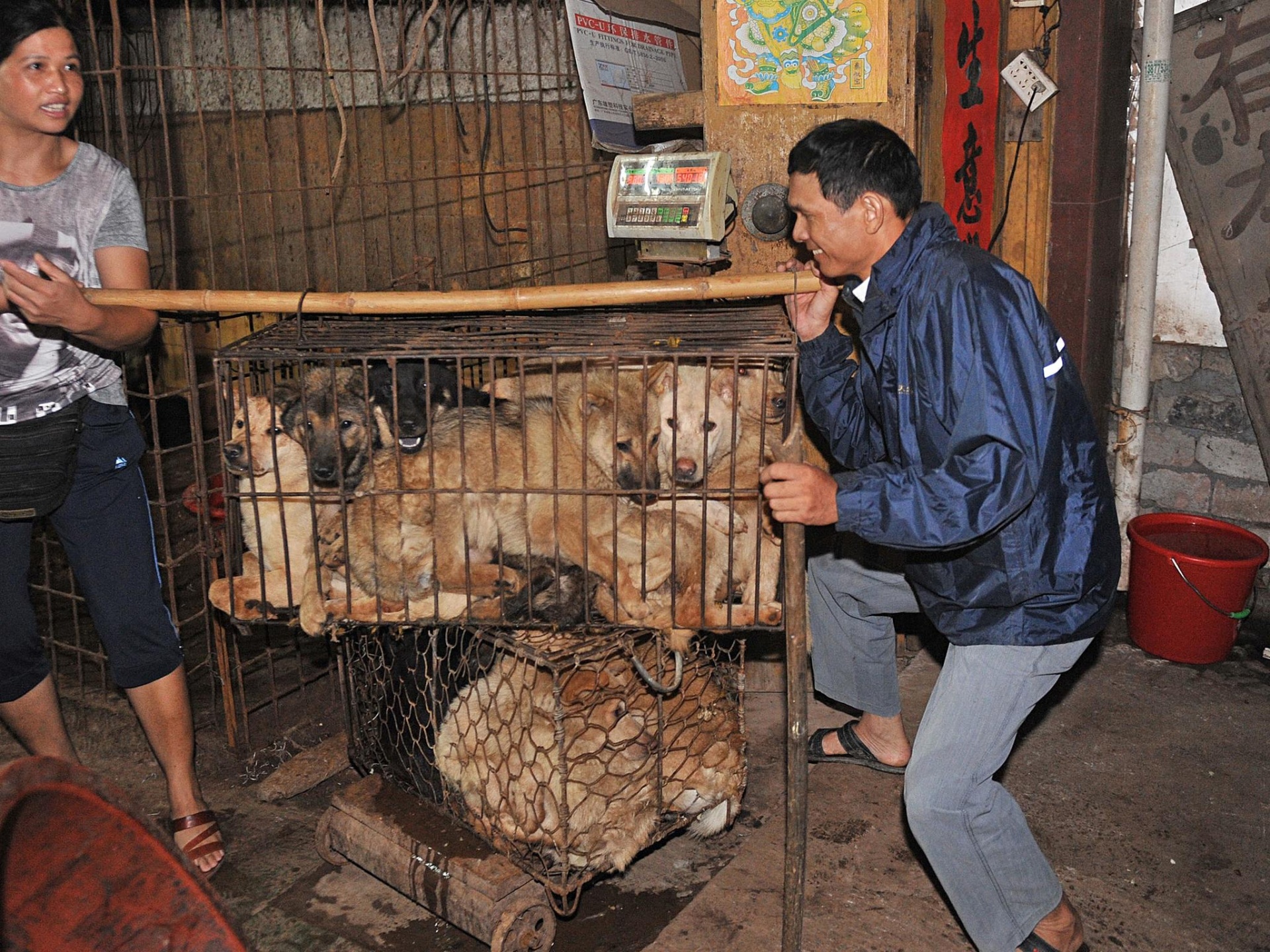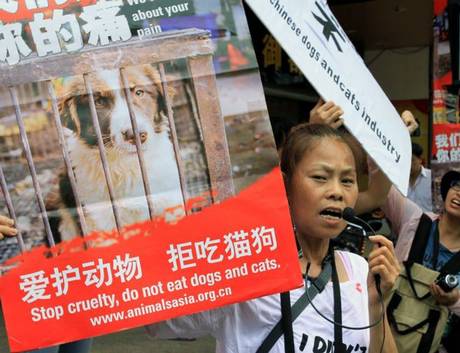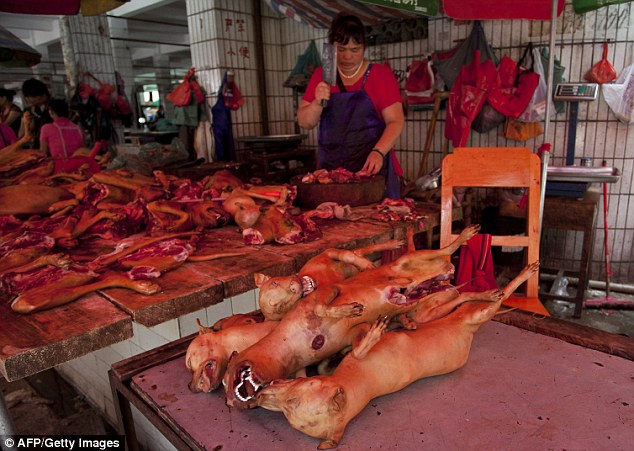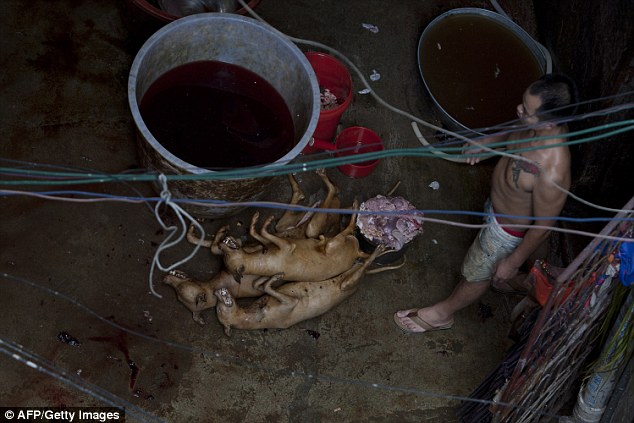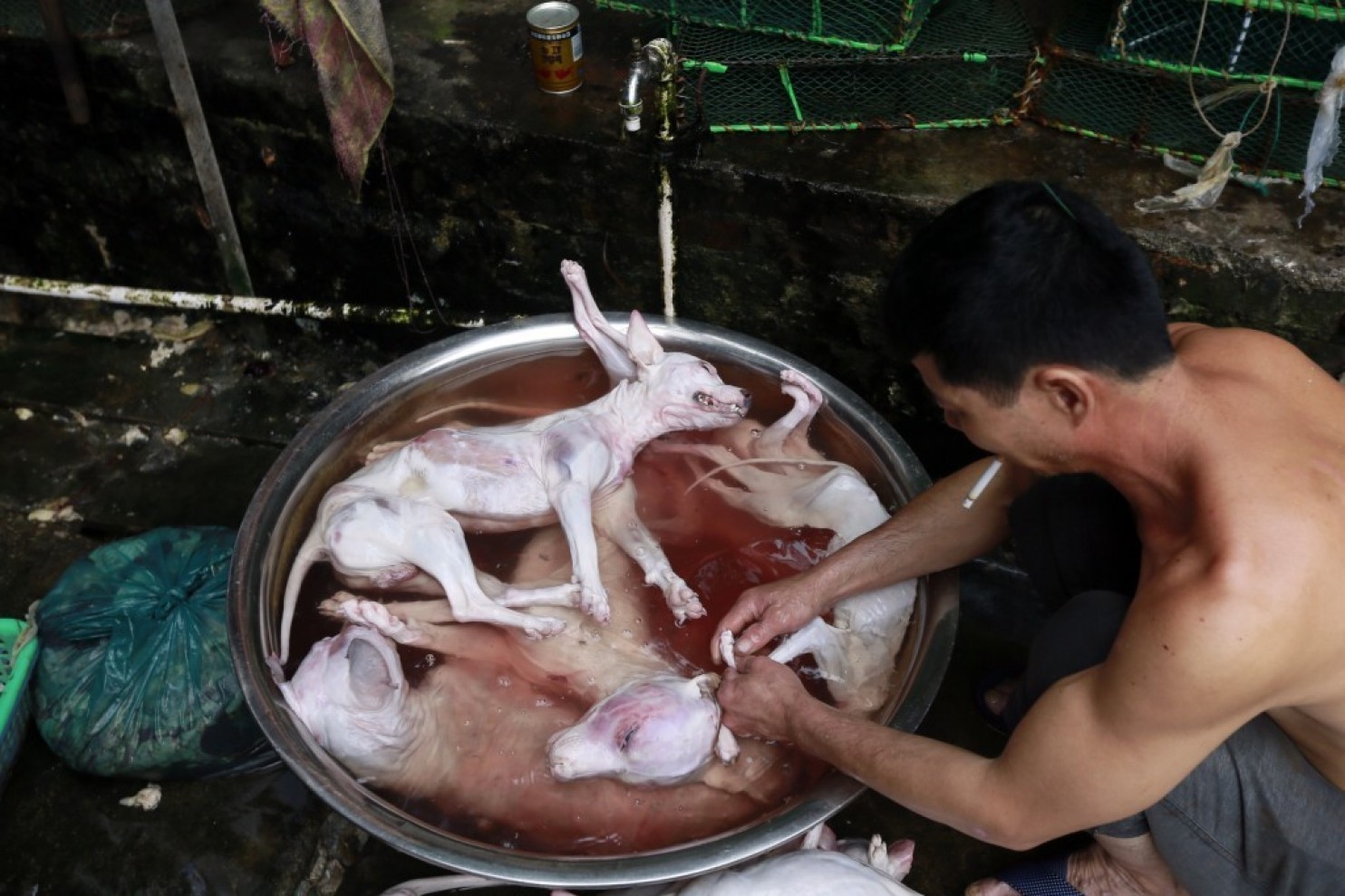Yulin Dog Meat Festival: 7 Facts You Should Know To Comprehend The Cruelty
Editor's Note: GRAPHIC CONTENT WARNING!
An estimated 10,000 dogs and cats are tortured, cooked alive and eaten at a festival, to be held this year on Monday, 22 June, in Yulin, a city in southern China, to celebrate the summer solstice. The meat, when combined with lychee and liquor, is said to have good-luck qualities. Below, we're listing down 7 facts you should know.
Slaughterhouse worker hooks a cat by its neck to place it in a wire cage for him.
Image via The Daily Mail1. Yulin dog meat festival, according to state-run news services, is a tradition that helps combat the heat and humidity of summer. However, activist groups have claimed that the festival started in 2009 or 2010 as a way for dog-meat traders to boost business.
A woman on her moped transports more than 10 dogs, which had just been slaughtered, to her market shop for sale.
Image via The IndependentStarted in the 1990s, the tradition has now evolved into an annual dog meat festival, one of the largest such festivals in China. The tradition has not only thrived in Yulin, but also in other southern cities such as Guangzhou and Huajiang.
2. Dogs and cats - sometimes stolen from their guardians and still wearing collars - are stuffed six each into cages so small that they cannot stand up or turn around. The slaughter process includes beatings, throat-slitting, and even burning and boiling dogs alive.
Sincere apologies. I didn't want to have to tweet these photos. Burnt & boiled alive for flavour. #StopYuLin2015 pic.twitter.com/NF3RKvGQ1X
— Ricky Gervais (@rickygervais) June 15, 2015
The Humane Society International calls Yulin a "festival of cruelty" and says most Chinese citizens would abhor what takes place there. Its China expert Peter Li went undercover at Yulin in May and witnessed preparations for the festival in full swing.
He described one slaughterhouse as "full of blood, internal organs of the dogs and cats, blow torched carcasses, and freshly slaughtered dogs hanging on hooks". Photographs showed dogs and cats packed into cages without room to move, with some reportedly dying of dehydration or starvation and carcasses strewn around the city's streets.
3. The local government has "banned" the festival, but this has been described as "semantics" by activists. As it's not illegal to slaughter dogs or cats in China, the event is expected to continue unofficially.
Pet dogs await their own death in a slaughterhouse, while they watch as others are slaughtered in front of them.
Image via AP Images for Humane Society InternationalMounting pressure from animal rights groups ignited uproar last year, prompting nationwide protests. Amid outcry, Yulin’s government banned public slaughter and advertising using words “dog meat,” though it claimed that although locals had held small get-togethers in the past, the city-wide festival was a myth
“The so-called summer solstice lychee dog meat festival does not exist,” the government said in a statement, according to Time. “Neither Yulin government nor social organizations have ever held such activities.”
The state news agency Xinhua said last year the festival is “only a local folk custom, without official sanction.” But locals say now, instead of slaughtering dogs in the streets, they do it in secret. “Now we have to do it as though we are thieves,” a local restaurant owner told a Chinese TV station, according to the Associated Press.
4. Chinese tradition says eating dog meat, which is not considered unusual in China, brings good health and luck. Estimates say 10 million dogs are killed for food every year. Some also believe that eating dog meat can scare away ghosts and disease, as well as heighten men's sexual performance, according to the SCMP.
Photos on state media showed groups of Yulin city residents tucking into plates of meat and vegetables around dining tables strewn with lychees. Other photos, which circulated widely on Chinese microblogs, were of skinned, cooked dogs hanging from hooks at street stalls or piled on tables.
Under the Yulin tradition, eating dog and lychee and drinking alcohol on the solstice is supposed to make people stay healthy during winter. It is unclear whether the supposed health benefits diminish if the feast is had before the actual solstice.
5. The festival also raises concerns about public health because the practices are unsanitary. Some dogs are poisoned when they're captured. Yulin also has high rates of rabies cases in humans, recording 338 cases between 2002 and 2006, according to VICE.
Chinese vendors transport cages of dogs to be killed and eaten at the Yulin annual summer solstice festival.
Image via Imaginechina/RexAnimal-rights activists say the event is a public health risk because the dogs undergo no quarantine to ensure they are free of disease, and that they are strays grabbed off streets around the country, as well as allegedly stolen from pet-owners. The dogs are often poisoned with toxic chemicals that could be harmful to humans, they say.
For its part, the government is primarily steering clear of festival politics – though it did ask civil servants to stay away from the event last year – and focusing instead on the food safety issues of dog meat.
An editorial in the state-run China Daily newspaper on June 12 called animal protection groups a “product of the very industrial system that believes in making money from people’s insatiable greed and love for certain things, including dogs,” before concluding that dog meat sold for consumption should meet food-safety inspections.
6. There has been much international condemnation of the annual dog meat festival in Yulin. The past month, there have been nearly a million tweets from people using the hashtag #StopYulin2015.
This week, British comedian Ricky Gervais, who has partnered with Humane Society International, wrote: “Please help our best friend. #StopYuLin2015.”
He attached a photo of a dog with a lipstick kisses on its face, saying: “The only marks you should leave on a dog.”
As of Thursday, Hong Kong-based animal rights group Animals Asia said its recent letter urging the country’s dog meat traders to boycott the festival had garnered about 70,000 signatures.
7. In China, people have come out on both sides of the debate. On Weibo, the Chinese social media, some have spoken out against consuming what Westerners consider pets, according to BBC News, while others said China's local customs must be respected.
The discussion features arguments both for and against eating dog meat, and has sparked the mobilisation of activists across the country, many of whom had never heard of the Yulin event before reading about it on social media.
One activist, who asked to be identified only by his surname, Hao, works with the Small Animal Protection Association in the city of Xi’an, northeast China. He has attended the Yulin event twice, to lobby the local government and protest against sellers.
“I wouldn’t know about it if it weren’t for the recent rise of social media here,” he told the Independent. “Now we have QQ and WeChat [both online messaging services] to spread news. Last year many volunteers connected with us and travelled to Yulin to join our protests.”
Images by the Associated Press for Humane Society International:
This picture taken on June 17, 2015 shows a butcher preparing cuts of dog meat for sale in Yulin.
Image via AFP/Getty ImagesButchered dogs are seen at a dog meat market in Yulin ahead of a local Dog Meat Festival, Guangxi Autonomous Region, June 17, 2015.
Image via ReutersA trader cleans de-haired dogs and cats. The dog on top was apparently a pet slaughtered for food, given the breed.
Image via AP Images for Humane Society International